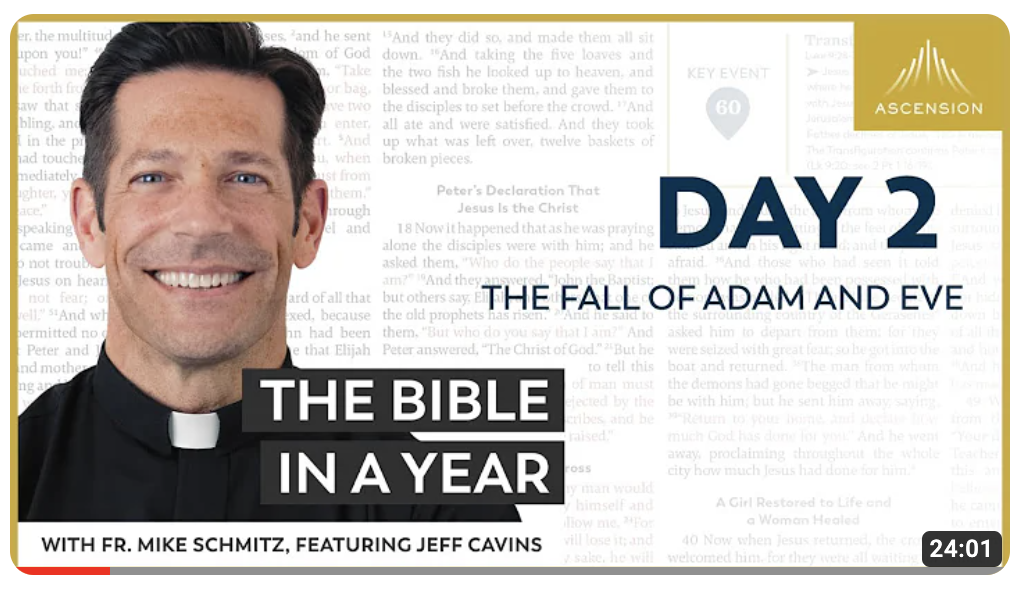Ascension Presents with Fr. Mike Schmitz- YouTube. Day 2, 2024

Genesis 3-4 and Psalm 104
Well, not a particularly auspicious start. I am a day late listening to the Day 2 readings as I was busy fiddling about with the settings on this new website. It has been a learning curve, and I have managed to get something together that is reasonably well set out. However, in some ways, this distraction is in keeping with the message from the readings Genesis 3-4. Fr. Schmitz’s analysis shows that it is easy to fall away from what may be best for us and to not give the first moments of the day and my best fruits to this endeavour to understand God and his plan for us.
As Fr. Schmitz says, things go wrong pretty quickly for humans after the first two short chapters of Genesis on all that is good that has been created in the Garden of Eden.
Eve is tempted by the serpent to eat of the tree of the knowledge of good and evil, and in doing so, the serpent calls into question God’s trustworthiness. He does not actually question God’s existence or his supreme power, as it is often read.
God, in fact, never actually forbade Adam and Eve from eating of that tree In Genesis 2, but merely warned them that if they did, they would surely die. God allowed us free will, which is required if we are to freely choose to love. If he did not give us the freedom of choice, then he would be a tyrant and would actually be demanding that we love Him. Instead, He desires for us to walk with him and belong to Him, and that He belongs fully to us.
Again, Fr. Schmitz emphasised that the tone with which we hear God’s words will colour the way we might understand Him. “Who told you that you are naked?” and “What have you done?” can be read as God’s wrath, but they may also be heard as God’s heartbreak that we will be separated from him outside of the peaceful garden. The explanation is given that because God knows that the knowledge of evil changes our original divine nature. Now that Adam and Eve erred, if humans were to eat of the Tree of Knowledge again while in that state falleness and mistrust of the Lord, we will be eternally separated from God, even if we stayed within the Garden.
And so, God sets about further cursing the serpent (Satan- who has his own story), but God does not actually curse Adam and Eve when he sets them outside the garden to toil in the earth or suffer during childbirth, respectively. What He sets up is a different path whereby humans must toil and sacrifice in order to find their own way back to belonging fully to God and residnig again with Him. This is alluded to when God set the pattern in place that to be with him will now require sacrifices, for he does not just send Adam and Eve out with their hastily sewn together fig leaf clothing, but he provides for them yet again by giving them leather skin garments.
So, the pattern is set in place: something has to die before humans can to belong entirely to God again. Ultimately, that something that must die is us. These lines show that God still walks by our side and provides for us in many ways, just not in the cool of the evening in the Garden of Eden anymore. It is us who have lost sight of him, not He who has lost sight of us. God walks with us out in the world until we can find our way back home to His source springing forth from the Garden of Eden.
Psalm 104 repeats many of the ideas presented in Genesis 1 and 2. It is a song of praise and wonder for the abundance of the Earth that God has brought forth for us. It is a reminder of what we do have gifted to us. In reference to Genesis 3, it shows that God is still providing for us, even though we have left the perfect unity of life provided when we were within the walled garden.
Genesis 4 shows how quickly the evil that is in the world and in men’s hearts makes things go wrong, with Cain killing Abel. The message spoken about in today’s reading is that in our work, if we do not offer up the best that we have to God in thanks for the gifts God’s has given us in the world, evil will take up residence within us and lead us to worse and worse actions.
In this biblical allegory, Cain merely picked up a few bits and pieces of seeds and plants that he had lying around to offer them up to God to become closer to him, but it is not pleasing to him. Abel, by contrast, offers up his first and best livestock, and this shows Abel’s willingness to give the best of himself to be pleasing to God. Cain grows jealous and resentful of Abel and then resorts to greater evil by murdering his own brother.
So, back to my inability to actually listen to something from which I might learn about the nature of God, I allowed distraction to creep in. I would have been better served listening and writing reflections on this Day 2 podcast episode rather than potentially falling away from the task before I had even really started it, and all because I was concerned about the colour schemes on my website! It is a small thing, and I am not beating myself up about it, but I do think I need to set aside a specific time each morning before the day’s tasks start in order to continue with this task I have set for myself. I think by developing this regular habit, I will benefit from the routine and discipline in other parts of my life. I think it will help to focus me as I do have a tendency towards laziness.
One further thought I have about some lines from Genesis 3 is the ones where God curses the serpent. I know that the New Testament is meant to be read in connection to the Old Testament and understood as the culminating message of God’s plan of salvation for us. As such, I think the lines:
“I will put enmity between you and the woman,
and between your seed and her seed;
he shall bruise your head,
and you shall bruise his heel.”
may refer to Jesus Christ coming into human history as God incarnate to further show humans the path back home. The serpent bruising His (Christ) heel is a reference to the crucifixion. I think the woman referred to here is Mary, the Mother of Christ, who in the Catholic faith is referred to as ‘The New Eve’ and who is often depicted as crushing the serpent’s head with her heel on behalf of her son, Jesus Christ. I just find it fascinating that these connections have been drawn out of the texts of the Bible by scholars.
I will continue to look out for more of these connections as I work my way through the Bible in a Year, even though I have not, as yet, read the New Testament in full. However, I have heard quite a lot of the readings of the New Testament as part of the Sunday Mass liturgies I heard as a child. I also recognise reasonably readily how much of the Bible is used intertextually across various forms of literature I have read and in films and even common parlance. It is the water that much of the world has been swimming in for 2000 years. I think one of the next books I may read will be Tom Holland’s ‘Dominion’, which discusses this phenomenon and how the story of Christ still impacts the way that we live and think now, compared with how humans lived and thought prior to Christianity.
The more you look, the more there is to find and try to understand.
Rebekah Martin.
Citations:
The Bible in a Year & More: Fr. Mike & Jeff Cavins. (2021b, June 13). Day 2: The Fall of Adam and Eve — The Bible in a Year (with Fr. Mike Schmitz) [Video]. YouTube. https://www.youtube.com/watch?v=WBg_xK44V0E

Leave a Comment